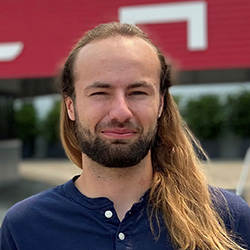
PhD Student Joshua Eckels Awarded NASA Space Technology Graduate Research Fellowship
Eckels recognized for innovative space technology research with NASA funding

Eckels recognized for innovative space technology research with NASA funding
Michigan Aerospace’s Ph.D. students have been staying busy this year! The highly competitive NASA Space Technology Graduate Research Opportunity (NSTGRO) has been awarded to another Aerospace Ph.D. candidate, Joshua Eckels, for his research titled, “Multifidelity reduced-order modeling of particle-in-cell simulations for anomalous transport closure models.”

“Many different approaches have been taken over the years to tackle this problem, all with varying degrees of success. I am excited that I’ve been given this chance to try out something new. This fellowship will grant the time and resources needed to work on this over the next several years,” says Eckels.
Eckels is pursuing a Ph.D. at U-M under Professor Alex Gorodetsky in Aerospace Engineering. His research is focused on applying uncertainty quantification (UQ) methods to Hall thruster models. “The motivation for this is that current models that exist for Hall thrusters are not predictive, that is to say, there is some level of uncertainty in the models themselves that prevents them from matching experimental data and extending to new operating conditions,” Eckels comments.
Eckels continues to explain that the end goal would be a robust Hall thruster model that can be used not only to predict essential performance quantities like thrust, but also to quantify the confidence level in these predictions. Such model-based design and UQ are vital to meeting future in-space propulsion needs and requirements.
“One of the central problems with Hall thruster models is the inability to fully capture the behavior of the thruster plasma on sufficiently large time and length scales,” explains Eckels. “A very common way to simulate the plasma is with particle-in-cell (PIC) methods, but these simulations are too expensive for model-based design and UQ. Instead, simplifications are made that significantly reduce computational expense but also introduce significant uncertainty. The problem of fixing or “closing” the simplified models is typically referred to as the anomalous transport problem.”
“I am excited for Josh to receive this award, and I look forward to him developing next generation methods for simulation and analysis of plasma and electric propulsion systems. I am eager to see what he can accomplish with the fellowship,” comments Gorodetsky.
The four-year NSTGRO NASA-sponsored fellowship seeks to sponsor “graduate students who show significant potential to contribute to NASA’s goal of creating innovative new space technologies for our Nation’s science, exploration, and economic future.” Additionally, students who are selected are matched with a NASA subject matter expert to serve as a research collaborator and will visit NASA centers for a few months each year to perform research and collaborate with NASA engineers.